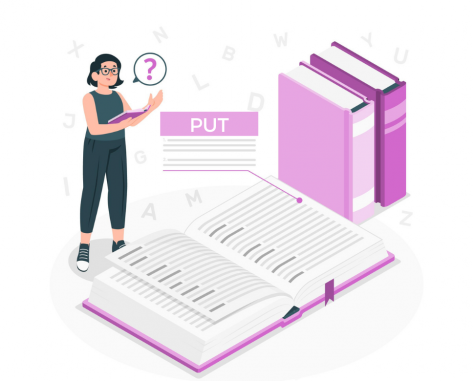WORKSHEET OVERVIEW
In this worksheet, students learn idioms and phrasal verbs with put. They also practise working out the meaning from context, and have an opportunity to use the new language in speaking activities.
IDIOMS WITH PUT
In the warm-up activity, students read the definition of the term idiom and guess what the title of the worksheet might mean. Then, they read six sentences containing idioms with put (e.g. put the finger on someone, put in a good word for someone, put words in someone’s mouth) and they try to explain what they mean. They also decide who might have said the sentences. After that, students imagine that a reporter asks them some questions and have to answer them using the idioms from the worksheet. The topics include celebrities, crimes, parenting and education. Next, students need to complete sentences with away, down, out or up. The sentences include the basic meanings of four phrasal verbs with put. The teacher can ask students whether they know any other meanings of these phrasal verbs to prepare them for the next part of the worksheet.
PHRASAL VERBS WITH PUT
Students start this part of the worksheet by matching answers to the questions they refer to. There are eight answers and they contain two examples of the use of each of the four phrasal verbs with put (e.g. put down a deposit, put away some money, put up a fence, put out a new line of sneakers). After that, students study the answers and have to work out the meanings of the phrasal verbs from context. While checking the task, the teacher can add any necessary details to students’ definitions. Finally, students discuss questions containing phrasal verbs with put. The topics of the questions range from favourite food and money for children’s education to electric cars and travelling.
Subscribe to unlock these and many other Standalone lesson with the Premium planWORKSHEETS













Great stuff! I do think there is a problem with this sentence:
Are you happy that our team made to the final? on slide 9.
I would think the correct question is “Are you happy that our team made it to the final?”
All the best!
filçipe
Hi Filipe! I must have missed that, sorry! Thanks for letting us know, we’ve just updated the worksheets and the e-lesson plan.
No worries! It was just a detail. You do a splendid job. Cheers!
Thanks!
Very good lesson!
Fantastic lesson! However, I have a query over the use of “put down” within this sentence: John put down how much he charges for his services as no one wanted to deal with him. The answer key states it means to reduce a price. However, I cannot say I have ever heard it used this way? I know put down has many meanings for e.g. to write down / insult / euthanise (for animals) etc.
When I first read the mentioned sentence, I thought it meant to ‘write down’, it wasn’t until I read the key I felt it was a bit confusing? I hope you can clarify this for me 🙂
Hi Nathan! I’m happy you like the lesson 🙂 Re your question, yes, reducing a price is actually one of the meanings of ‘put down’. You can check it out, e.g. here. It might be more common in British English though. Hope that helps!